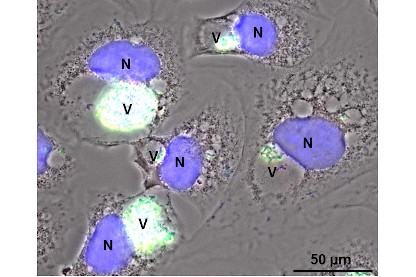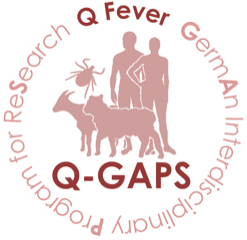Characterization of the interaction of Coxiella burnetii Nine Mile II with cells from different
host species

[Photo: Schulze-Lührmann]
Q fever is an infectious disease caused by the bacterium Coxiella burnetii: Coxiella burnetii bacteria (green) are located in a so-called vacuole (V) inside a cell. The Coxiella burnetii containing vacuole can even get to the size of the nucleus (N, blue).
Abstract
Coxiella burnetii is a Gram-negative pathogen that causes the zoonotic disease Q fever. This obligate intracellular bacterium is typically transmitted to humans by inhalation of infectious material derived from sheep, goats and cattle. Q fever is often an asymptomatic infection or causes mild flu-like illness, but can also develop into an interstitial pneumonia or hepatitis. Furthermore, the infection can become chronic which is potentially fatal. In contrast, infection in livestock is mostly asymptomatic but can cause abortion and reduce reproductive efficiency. In addition to livestock the reservoir of C. burnetii includes birds and arthropods (especially ticks). However, the mechanism and epidemiological role of transmission of C. burnetii by ticks is poorly understood. The current increase in worldwide Q fever cases underlines the exceedingly high relevance of C. burnetii as a pathogen and pinpoints the lack of understanding of Q-fever pathogenesis. Therefore, we will determine the role of virulence factors in pathogenicity. This will include the generation of C. burnetii mutants. Additionally, we will investigate the interaction of C. burnetii with cells from different host species (cattle, sheep, goats, ticks and human) to learn why C. burnetii is mainly asymptomatic in cattle, sheep and probably in ticks, but causes disease in humans.FINAL REPORT Q-GAPS 2017 - 2021 in German
Principal investigator

Prof. Dr. Anja Lührmann
Universitätsklinikum Erlangen
Institut für Klinische Mikrobiologie
Immunologie und Hygiene
Wasserturmstr. 3/5
91054 Erlangen
Anja.Luehrmann(at)uk-erlangen.de
Scientific Assistants
Arne Cordsmeier (MSc)
Universitätsklinikum Erlangen
Institute of Cinical Microbiology, Immunology and Hygiene
Wasserturmstr. 3-5
91054 Erlangen, Germany
Universitätsklinikum Erlangen
Institute of Cinical Microbiology, Immunology and Hygiene
Wasserturmstr. 3-5
91054 Erlangen, Germany
Michael Mauermeir (MSc)
Universitätsklinikum Erlangen
Institute of Cinical Microbiology, Immunology and Hygiene
Wasserturmstr. 3-5
91054 Erlangen, Germany
Universitätsklinikum Erlangen
Institute of Cinical Microbiology, Immunology and Hygiene
Wasserturmstr. 3-5
91054 Erlangen, Germany


